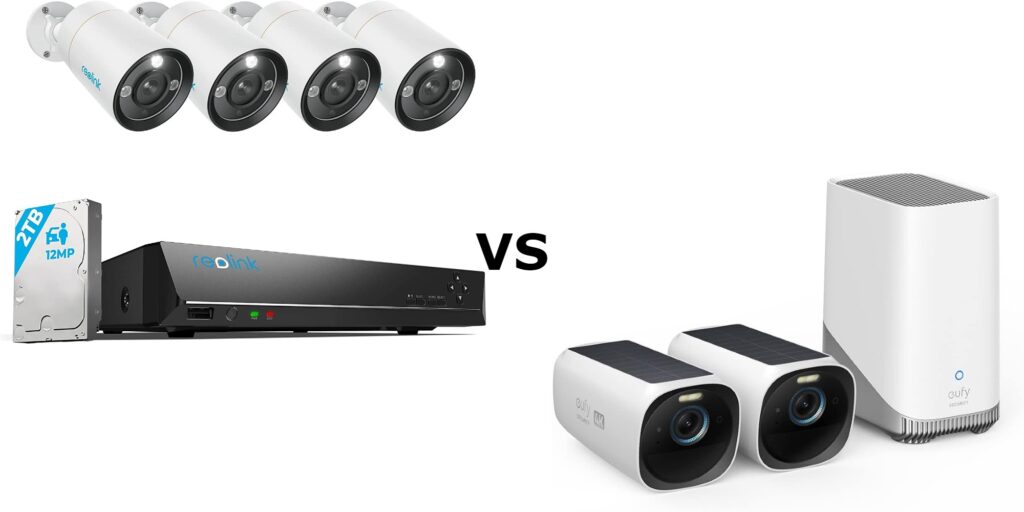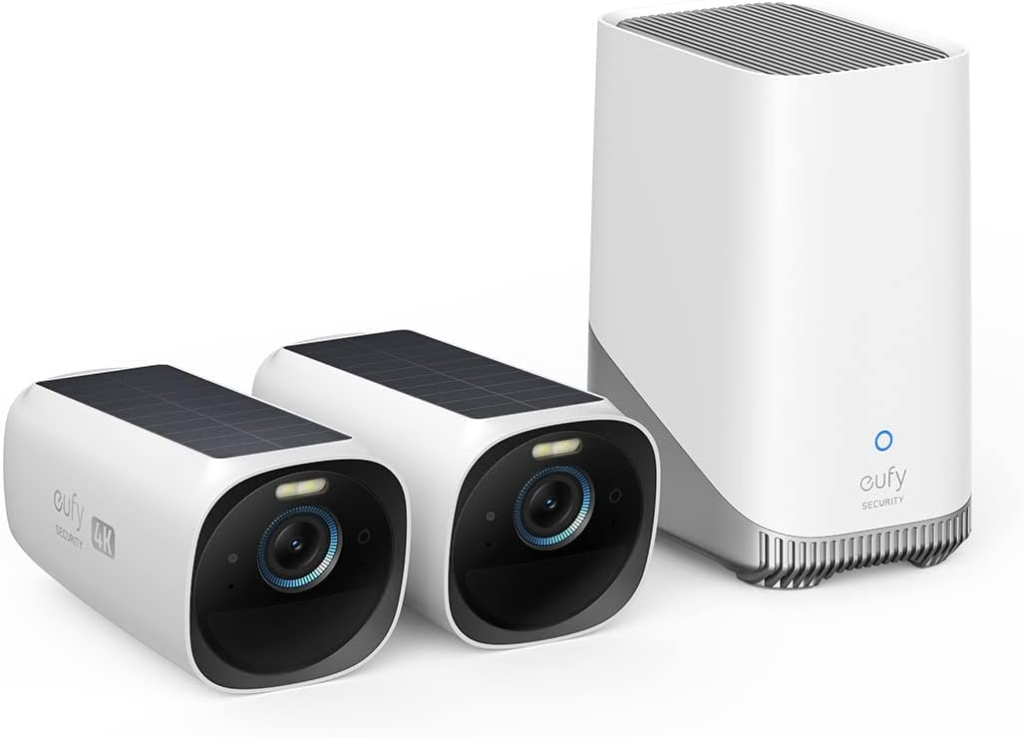
When kitting out your home with security cameras, it can be difficult to figure out whether you should opt to install wired cameras, or make the move to a fully wireless setup. Today, we’re going to take a balanced look at both options, and the pros and cons of each.
Wired security cameras tend to be a better option for 24/7 surveillance, whilst wireless cameras tend to be a lot easier to install and cheaper – this is why wireless cameras are becoming increasingly popular, especially as many tenants are don’t want to drill holes and deal with wiring.
Wired Security Cameras
Wired security cameras have been the go-to option for decades, and until fairly recently was the only option available if you needed to secure your home with a surveillance system. Wired security cameras have always historically tended to have some kind of storage device they plug into,
These local storage devices are ideal for recording large quantities of surveillance footage, with many popular systems like the Swann Home DVR system coming with over 1TB of storage. In comparison, many wireless outdoor cameras opt to instead use a micro SD card to record to, which tend to only support considerably less in the way of storage space.
From a security standpoint, there are a number of wired CCTV systems which have no access to the internet. Although many of us enjoy the convenience of being able to check a camera’s live feed from our smartphone, some questions have been raised around whether devices like this can cause potential security concerns, as there have been numerous cases where IT security researchers have managed to remotely access people’s wireless security cameras which have not been properly set up in a secure manner.
Don’t worry if you do still want home assistant integration though – many modern options do support smart home integration to keep up with the times, and that includes Swann, who make some of the best value wired security systems out there.
Many wired cameras as designed in a more “serious” way, which can mean that although they aren’t always cheap, a lot of businesses still prefer to opt for a wired solution.
There are a number of compelling benefits of sticking to a good old wired setup, but also a couple of potential downsides:
Pros
- 24/7 recording is easy and pain free, unlike on most wireless security cameras
- Huge local storage options are easy to come by, meaning you can store a ton of footage
- Many options don’t require a monthly subscription to use, as they don’t rely on cloud storage subscriptions
- More “secure” in a number of ways when compared to many wireless cameras
- Perfect for larger properties where Wi-Fi can be problematic
- Less vulnerable to hackers, since many don’t have internet access
- Even if the camera is damaged, footage up until this point are safely secured inside your home
- No worries around needing to take the camera down to charge it
Cons
- Wiring can be costly and difficult
- Not ideal for most tenants
- Many DVRs have small limits on the number of cameras which can be connected (since there are a limited number of ports)
- Installation and setup is almost always longer for wired cameras compared to wireless.
Why You Should Buy a Wired Security Camera
So, in summary, there are still a number of compelling reasons which make investing in a number of wired security cameras a great option, even when compared with cheap wireless alternatives.
Firstly, if you are in the need of 24/7 recording taking place around the clock, the wired is a no-brainer. Almost all wireless cameras only start recording when motion is detected, which means that if someone is sneaky, it’s possible to get past a wireless camera, as long as you can avoid triggering a recording.
Additionally, unless you connect a wireless camera to a solar panel, it is going to need charging occasionally. How often you need to charge one depends on how often motion is triggered, the battery size and also how often you check the live camera feed. On the other hand, wired cameras may take a little more effort to set up initially but they are more of a set and forget solution – especially good ones. If you invest in high quality cameras, it’s possible to install them once and then not touch them for potentially years.
Why You Shouldn’t Buy a Wired Camera
There are a couple of notable disadvantages to investing in a wired security camera system which are worth pointing out. Despite being a great option for many, wired cameras can be costly to properly wire up. Thanks to both the difficulty and the cost of getting all of this wiring done, it’s extremely rare for a tenant to go out of their way and spend potentially thousands on a permanent wired CCTV setup, especially since tenants tend to move quite frequently. If there’s only a year left on a rental agreement, it can be hard to justify forking out money on doing all of this.
Which Wired Cameras Are The Best?
Generally, the most cost effective way to properly monitor your property using wired cameras is to buy a full setup, as opposed to individual cameras. One of the best on the market is the Swann Home DVR system. In our opinion, the best value option is the 4 4k camera and DVR set. For four 4k cameras and loads of storage in the 8 channel DVR, this kit ends up being more cost effective than many equivalent wireless setups.
Another benefit of the Swann is that if you opt for the 8 channel DVR, there’s room to upgrade and add additional cameras over time if you decide to. This is a super popular option for small businesses especially, who need to monitor a large space 24 hours a day.
Another popular alternative which costs slightly more is this Reolink 12MP PoE system – it comes with 4 cameras which can record at a resolution of up to 4k, as well as a great 8 channel NVR and 2TB hard drive. These cameras are top of the line – you’d be hard pushed to find wireless cameras which record to this level of detail. Night vision is superb too, at up to 100 feet. Reolink are responsible for some of the best security devices on the market, such as the Argus 3 Pro, and this kit is no exception.
Wireless Security Cameras
Wireless security cameras have hugely improved, especially in the last 3 years or so. Gone are the days of poor connections, bad recording quality and even worse battery performance. Today, it’s possible to buy a wireless outdoor camera which is waterproof, costs less than £150, records in stunning quality and lasts for up to six months on a single charge. If this sounds ideal, then join the club – a majority of this site’s audience also have opted to install wireless security cameras in their homes and small businesses.
The main selling point which convinces so many to take the wireless path is the ease of installation. Not everyone wants to have to think about doing some fairly permanent work on their home to get a number of wired cameras installed, when they can instead opt to basically just mount a small camera without any wires necessary instead.
Wireless cameras aren’t always the ideal path to take though – if you want around the clock, 24/7 recording then wireless isn’t really an option – although batteries are getting better, it would be impossible for a wireless camera to record constantly without running out of battery in a day or two.
Additionally, even if they could, constant video streaming across your home network would cause a vast majority of connections to slow down significantly, especially if multiple cameras were rolling at the same time.
This leads me on to the second main drawback, which is more an issue with many British homes than the cameras themselves. Unlike in America, many of us live in older buildings with thick, solid brick walls and well insulated homes – this can mean a camera placed at the bottom of your garden may not actually be able to maintain a good enough connection for video streaming, especially in higher resolutions.
There are some workarounds though, such as investing in Wi-Fi range extenders. This all very much depends on a number of factors, including the range of your Wi-Fi, as well as how big your house is and what’s it has been constructed from. Generally speaking though, most “normal” sized homes are unlikely to find this to be an issue, since most people don’t have a great distance between their front door and router. On the other hand, if you’re in a large detached property with a number of outbuildings, it may be a challenge to get a wireless camera connected to your home network from a large distance, without investing some money into some expensive Wi-Fi gear.
Pros
- Easy to install
- Often cheaper than wired cameras
- Many come with features rarely found on wired cameras
- Perfect for tenants and normal homes
- Countless amazing options on the market
- Can still work even during a power cut (given the camera has local storage)
- Solar power is an option on many cameras – cheap and eco friendly!
- Very energy efficient
- Great smart home integration in a number of models
Cons
- Most wireless cameras rely on a good internet connection
- Some concerns regarding internet security
- No option of 24/7 monitoring
- Wi-Fi outages could potentially cause some problems
- Batteries will occasionally need charging if truly wireless
Why You Should Buy a Wireless Camera

If you need a no-fuss surveillance system set up ASAP, and want to do it on a tight budget without doing a load of wiring, then wireless is definitely your best bet. It’s also possible to use cameras from different brands without too much of an inconvenience, which can’t always be said for wired cameras. Many of those rely on proprietary technology, so it’s not a one-size fits all solution.
Additionally, most homeowners only want to see footage or be notified if some movement is detected, which can save your from having to trawl through hours of footage looking for anything, which is a disadvantage of some wired systems, even to this day.
Wireless surveillance camera manufacturers also tend to be slightly more innovative. Some fairly life changing technology, such as instant two-way audio tend to work more smoothly with wireless devices, thanks to the companies all working hard to create the best software experience they can.
Why You Shouldn’t Buy a Wireless Security Camera
There are a few notable reasons and circumstances which would make buying wireless cameras the more ideal option. As we mentioned earlier, wireless cameras don’t have the ability to record constantly due to battery limitations, so if you’re in the need of around the clock recording, then wired is the better option.
There is also a potential increased security vulnerability when compared to a wired setup. There have been a few cases where hackers have managed to hook into live camera feeds of unsecured wireless cameras. The risk of this can be mitigated by ensuring your network and camera is properly secured.
Which Wireless Security Cameras Are The Best?
There are so many great options when looking for great wireless cameras, especially outdoor ones. To save you a bit of time in picking the right one for you, we have compiled a comparison of our favourite ones here. All of these cameras can be used without needing to pay for a monthly subscription, so don’t worry about that.
If you’re looking for a full kit with works in the same way as a traditional wired setup, just without the pesky wiring, then the eufycam 3 (S330) kit is a brilliant option. Two 4k wireless cameras with built in solar panels and a separate storage device for saving your recordings. Take a look at our full in-depth review of that kit here. The huge benefit of these cameras is that on just 2 hours of sunlight per day, the eufycam 3 can potentially run indefinitely without requiring a charge.
